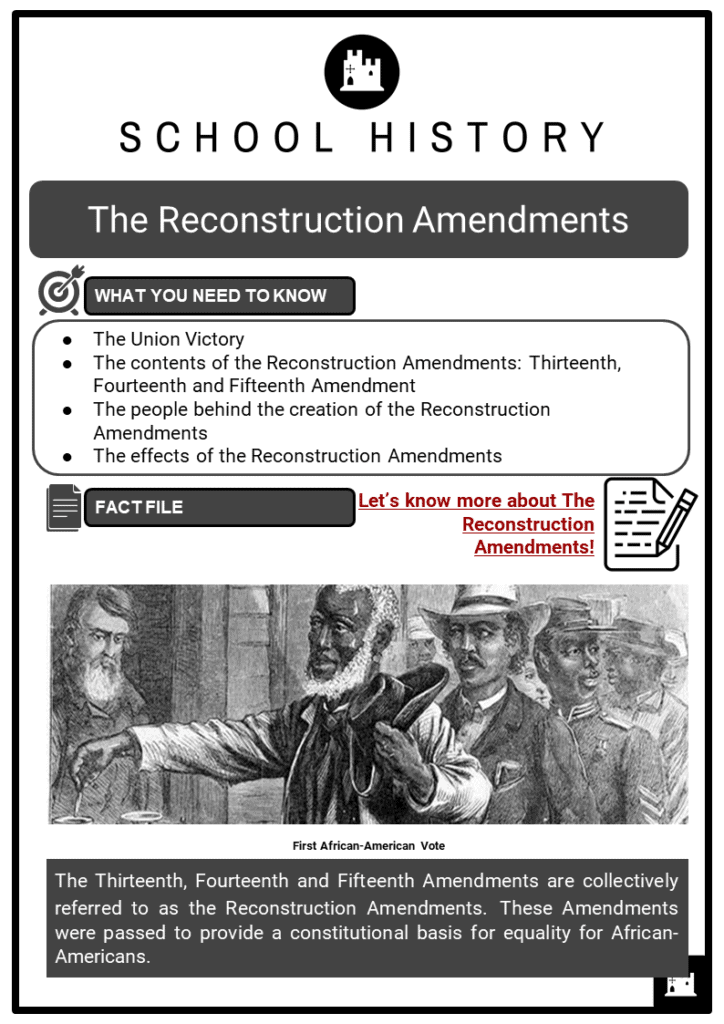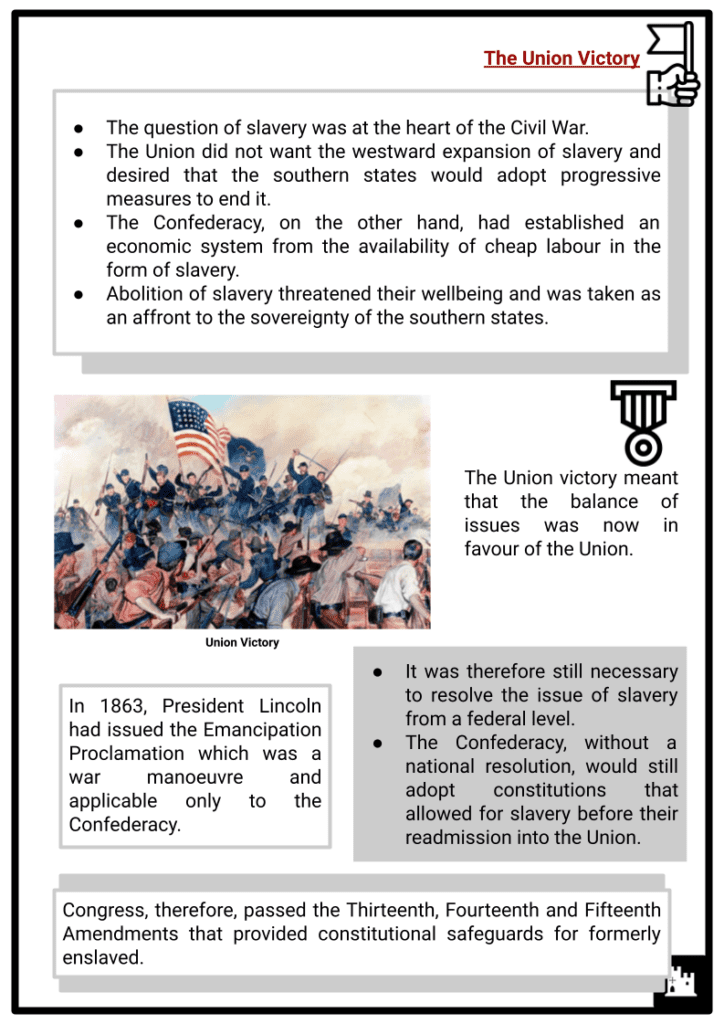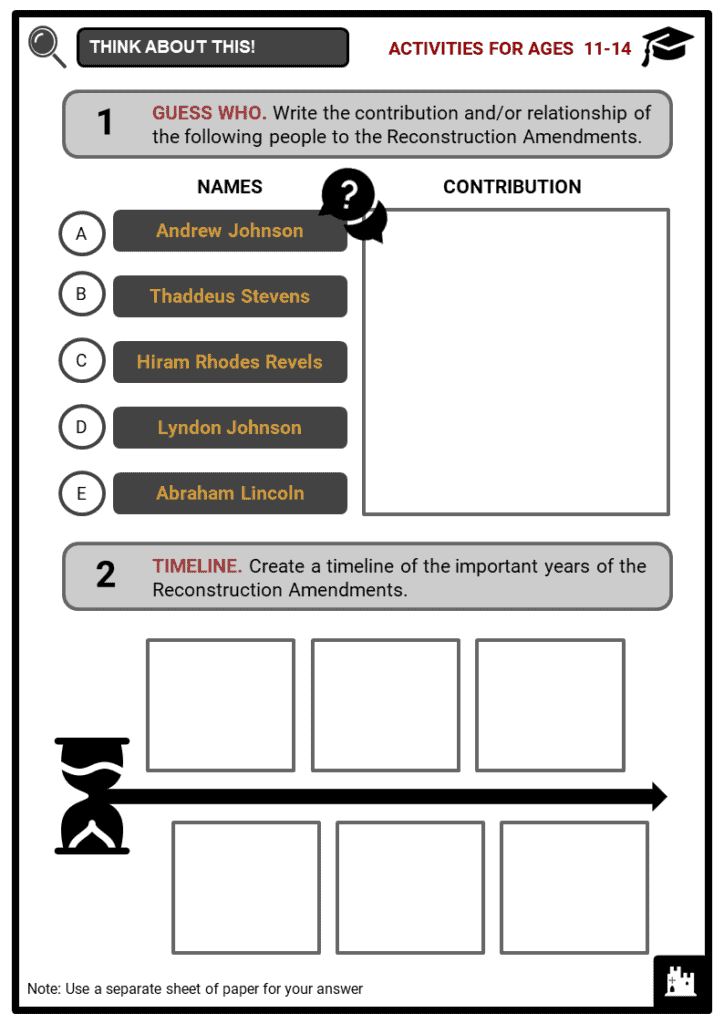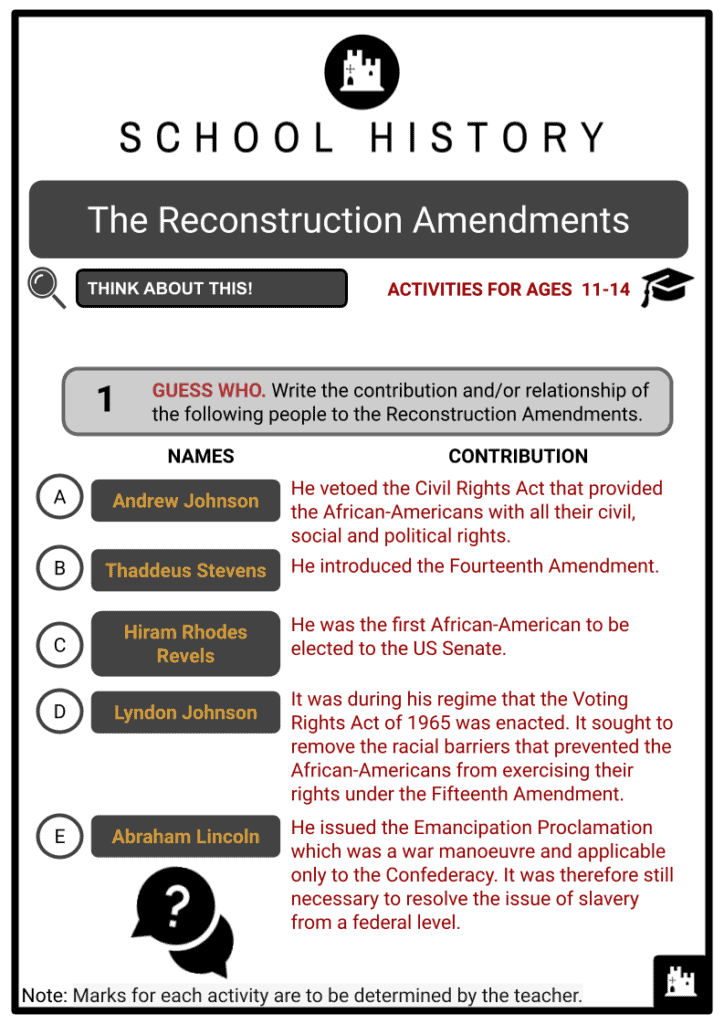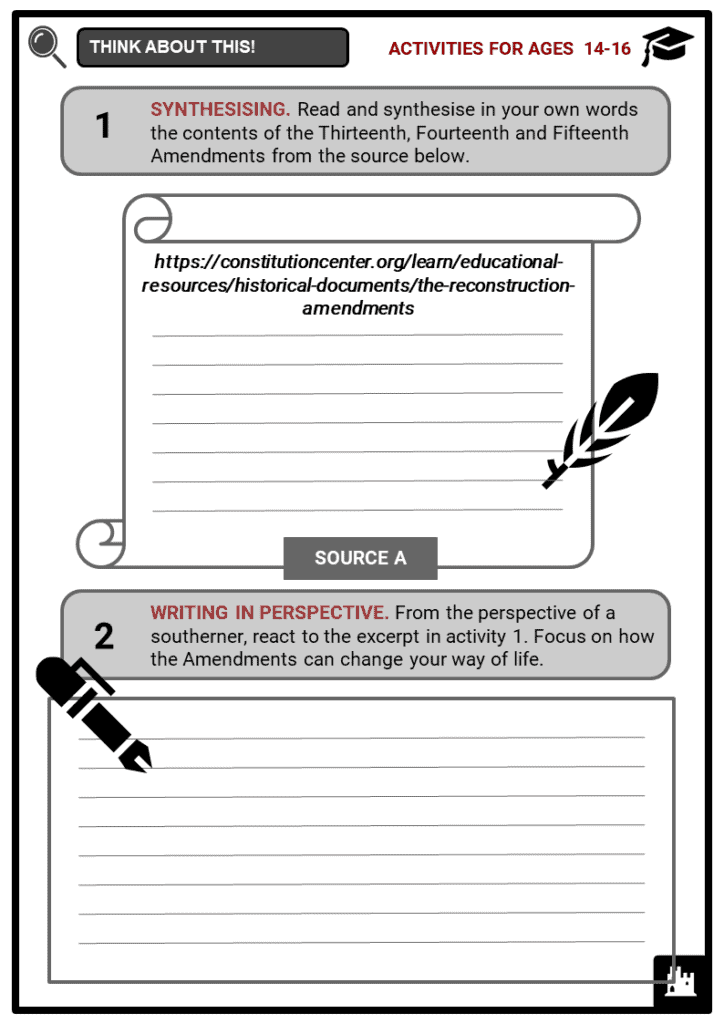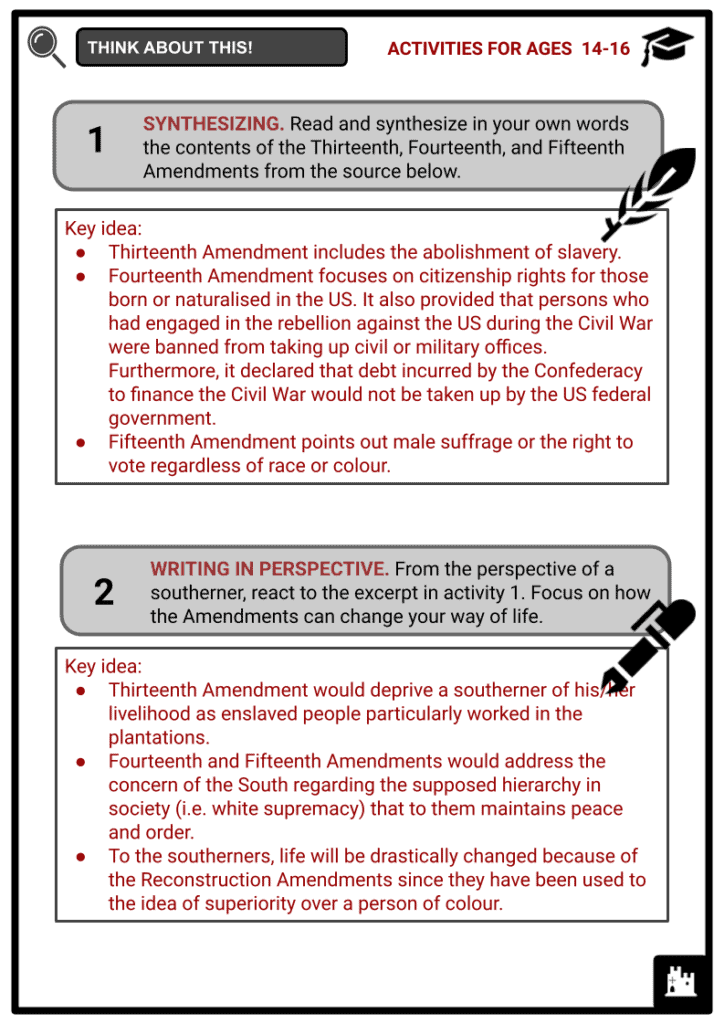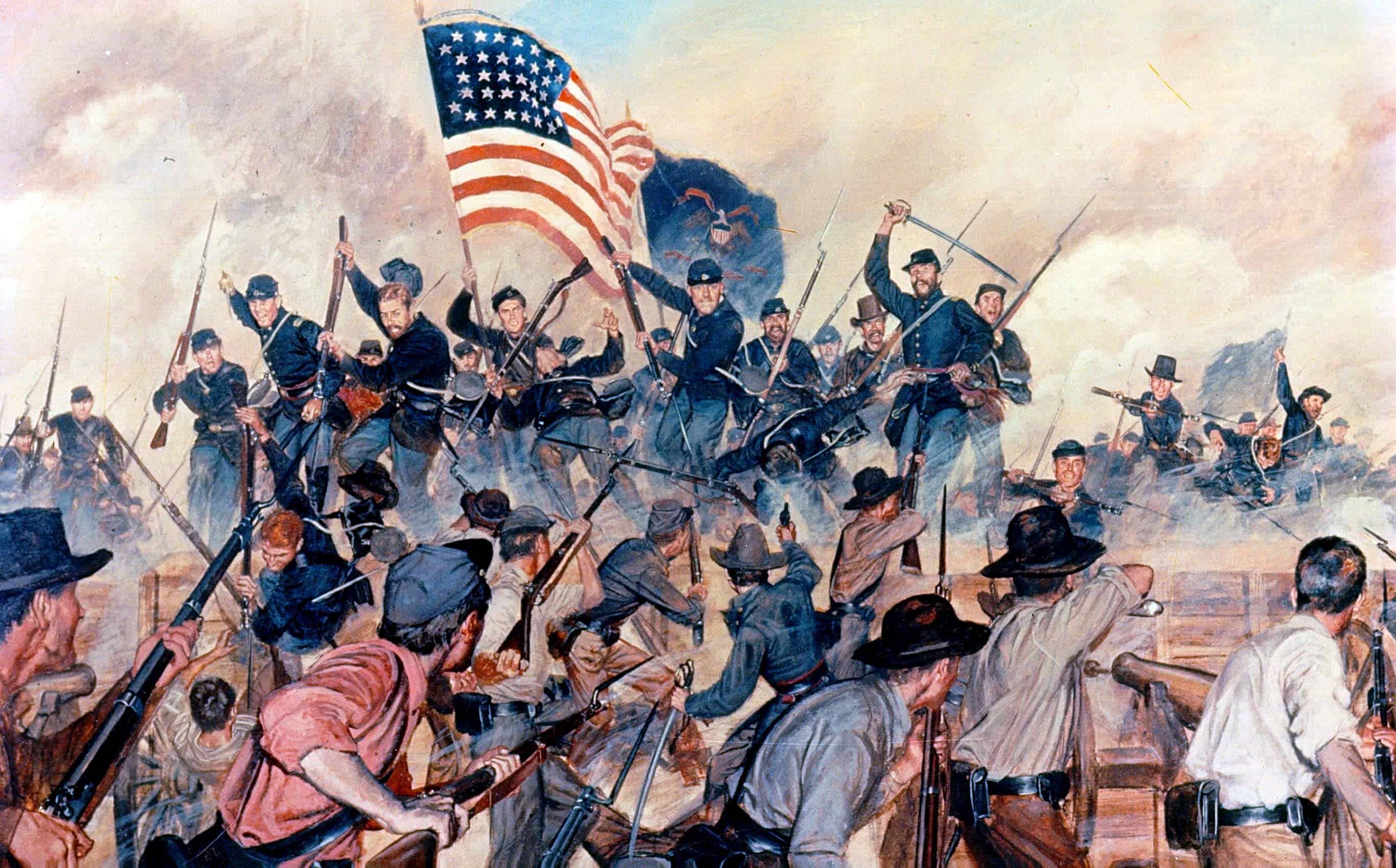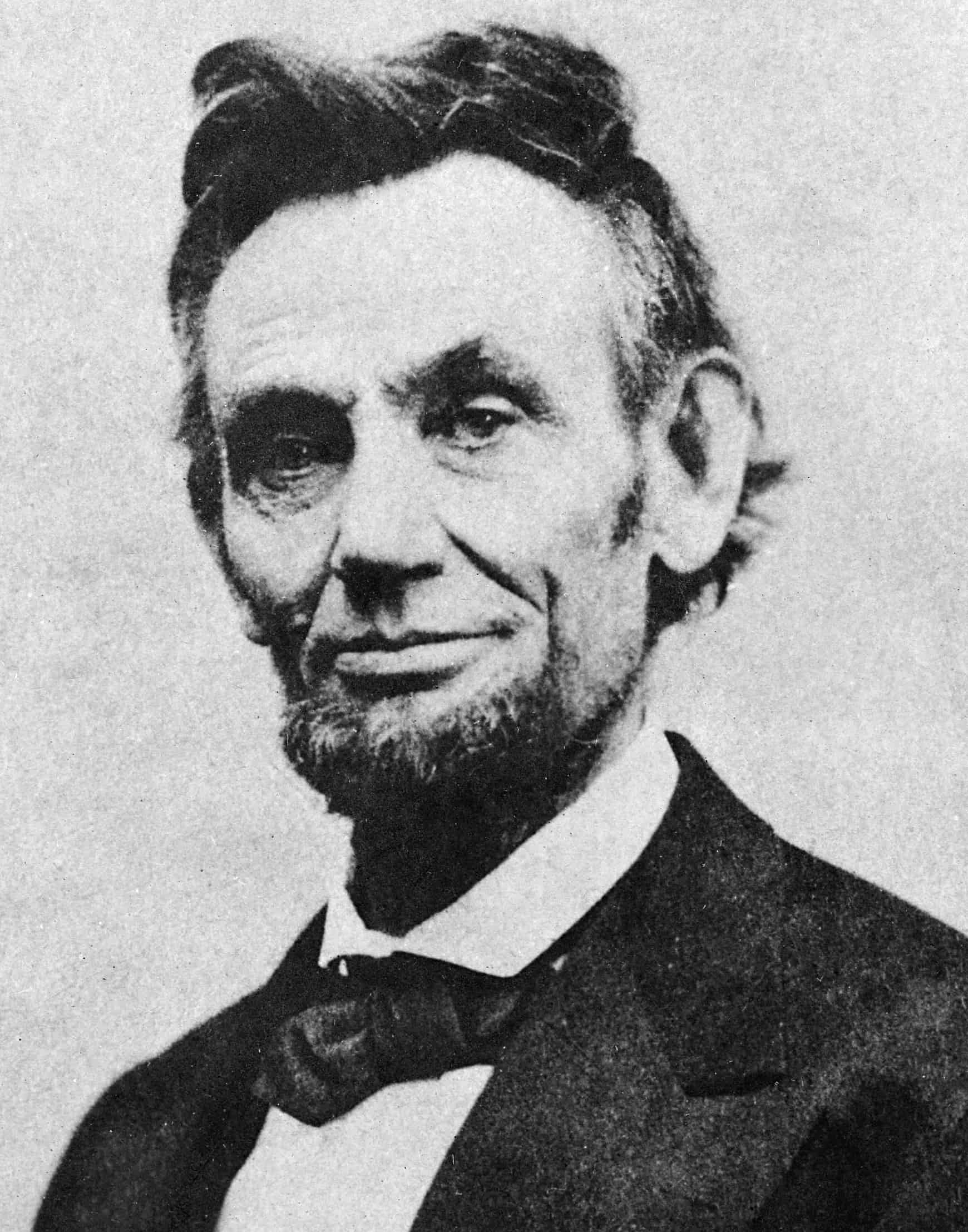Download The Reconstruction Amendments Worksheets
Do you want to save dozens of hours in time? Get your evenings and weekends back? Be able to teach The Reconstruction Amendments to your students?
Our worksheet bundle includes a fact file and printable worksheets and student activities. Perfect for both the classroom and homeschooling!
Table of Contents
Add a header to begin generating the table of contents
Summary
- The Union Victory
- The contents of the Reconstruction Amendments: Thirteenth, Fourteenth and Fifteenth Amendment
- The people behind the creation of the Reconstruction Amendments
- The effects of the Reconstruction Amendments
Key Facts And Information
Let’s know more about The Reconstruction Amendments!
- The Thirteenth, Fourteenth and Fifteenth Amendments are collectively referred to as the Reconstruction Amendments. These Amendments were passed to provide a constitutional basis for equality for African-Americans.
The Union Victory
- The question of slavery was at the heart of the Civil War.
- The Union did not want the westward expansion of slavery and desired that the southern states would adopt progressive measures to end it.
- The Confederacy, on the other hand, had established an economic system from the availability of cheap labour in the form of slavery.
- Abolition of slavery threatened their wellbeing and was taken as an affront to the sovereignty of the southern states.
- The Union victory meant that the balance of issues was now in favour of the Union.
- It was therefore still necessary to resolve the issue of slavery from a federal level.
- The Confederacy, without a national resolution, would still adopt constitutions that allowed for slavery before their readmission into the Union.
- In 1863, President Lincoln had issued the Emancipation Proclamation which was a war manoeuvre and applicable only to the Confederacy.
- Congress, therefore, passed the Thirteenth, Fourteenth and Fifteenth Amendments that provided constitutional safeguards for formerly enslaved.
Thirteenth Amendment
- The Thirteenth Amendment was passed by Congress and ratified in 1865.
- In 1776, slavery was legal in all the thirteen colonies, and most of the founding fathers had enslaved people.
- Whereas the declaration of independence provided for the liberty and equality of all in the new nation, there was no explicit mention of slavery.
- At the time of the Civil War, 15 southern and border states had over four million enslaved people.
- The Emancipation Declaration was issued as a war tactic applied to only the Confederate states rebelling against the Union.
- 1864 was an election year.
- Senate passed the proposed Thirteenth Amendment with the required two-thirds majority and forwarded it to the House of Representatives.
- In the latter house, the Democrats, the majority of whom were southern legislators, did not pass the Amendment.
- During the election, Lincoln beat the Democrat candidate General McClellan.
- Top of the Republicans’ agenda was the dicey Thirteenth Amendment.
- Lincoln was openly in favour of the Amendment, and he lobbied various Congressional representatives to vote for it, promising incentives as the President of the United States.
- In 1865, the House of Representatives also passed the Amendment by the required two-thirds majority.
- The Amendment was then forwarded to the state legislatures for ratification.
- Among the pre-conditions of the Confederate states joining the Union was the ratification of the Amendment in their respective constitution.
- The Amendment banned slavery and involuntary servitude except as a punishment for crime.
- The Amendment also gave powers to Congress to pass legislation to support its implementation.
- Thus, the following year, Congress passed the Civil Rights Act of 1866 to address the Black Codes and widespread racial discrimination faced by African-Americans.
Fourteenth Amendment
- The Fourteenth Amendment was passed by Congress in 1866 and was ratified in 1868.
- The southern states were still bent on maintaining the institution of slavery.
- Therefore, they passed the Black Codes, meant to limit the rights and privileges of the African-Americans.
- The Black Codes prevented formerly enslaved from travelling far, owning certain types of properties, and instituting legal actions in courts.
- Further, failure to pay debts would lead to imprisonment and convicts were leased to private businesses.
- The Civil Rights Act provided for the civil rights of African-Americans, including the right to sue, own property, and engage in fair contractual terms.
- However, African-Americans were still facing racial discrimination on the political and social front.
- The omission was deliberate because Congress feared President Andrew Johnson would veto a bill that provided African-Americans with all their civil, social and political rights.
- However, as Congress feared, Johnson, who was at constant loggerheads with Congress, vetoed the bill. But Congress overrode his veto, and the bill was enacted.
- The Fourteenth Amendment was introduced by Thaddeus Stevens, a member of the House of Representatives.
- He is known for his reconstruction efforts and also introduced a motion that attempted to impeach President Andrew Jackson in 1867.
- The proposed Amendment provided for the definitions and rights of the citizens of the US, for those born or naturalised in the US.
- It squashed the Dred Scott of 1857 which provided that blacks were not eligible for citizenship.
- At this point, the balance of political power was in favour of the southern states.
- By providing the criteria for determining the number of representatives of states depending on the number of residents, the Amendment rectified the imbalance.
- It amended the 1787 Three-Fifths Compromise negotiated during the Philadelphia Convention.
- The three-fifths system gave southern states a greater slave count dominance in the House of Representatives, with 44 representatives as opposed to 33 as they would have been without the compromise.
- It also meant that southern states held control of the Electoral College whose representatives equalled the number of delegates in the Senate and House of Representatives.
- This guaranteed the South’s control over policy issues concerning slavery.
- However, over time, the population of the North rapidly grew, and after the Civil War, the balance of power shifted to the northern states and the Republicans.
- The Amendment also provided that persons who had engaged in the rebellion against the US during the Civil War were banned from taking up civil or military offices.
- It also declared that debt incurred by the Confederacy to finance the Civil War would not be taken up by the US federal government.
- The Amendment also empowered Congress to enact enforcement measures for its proper implementation. Congress passed the Amendment, and it was forwarded to the states for ratification.
- In July 1868, Louisiana and South Carolina ratified the Amendment, bringing the total number of states to approval to 28, which made it an official constitutional Amendment.
- However, Ohio and New Jersey have withdrawn their ratification, an action not provided for in the Constitution.
- Southern states were lobbied by Johnson to reject the Amendment, but Congress has required that former rebellious states be subject to military rule until they ratified the three constitutional Amendments.
- Furthermore, the withdrawals caused Congress to pass a resolution declaring the validity of the Fourteenth Amendment as a part of the federal constitution.
Fifteenth Amendment
- The Fifteenth Amendment was passed by Congress in 1869 and was ratified in 1870.
- It granted universal male suffrage to African-Americans.
- It also gave Congress the power to enact legislation for the proper implementation of the Amendment.
- By the end of the year, all former Confederate states were dominated by Republicans, in part due to the voting patterns of African-Americans.
- The dominance was somewhat short-lived as, by the end of the decade, the southern states had reverted back to the Democrats.
- Hiram Rhodes Revels from Mississippi was the first African-American to be elected to the US Senate, and 600 other African-Americans served in Congress during the Reconstruction.
- After the Reconstruction, the Amendments may have ensured African-Americans the right to vote. However, it did not stop the southerners coming up with ways to disenfranchise African-Americans. Taxes and literacy tests were introduced as pre-qualifications to prevent African-Americans from voting.
- The Voting Rights Act of 1965 enacted under the regime of President Lyndon Johnson, sought to remove the racial barriers that prevented African-Americans from exercising their rights under the Fifteenth Amendment.
Image sources:
[1.] https://upload.wikimedia.org/wikipedia/commons/0/03/First_at_Vicksburg.jpg
[2.] https://upload.wikimedia.org/wikipedia/commons/8/87/Abraham_Lincoln_April_10_1865.jpg

